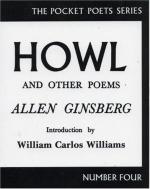|
This section contains 865 words (approx. 3 pages at 400 words per page) |

|
Howl, and Other Poems Summary & Study Guide Description
Howl, and Other Poems Summary & Study Guide includes comprehensive information and analysis to help you understand the book. This study guide contains the following sections:
This detailed literature summary also contains Topics for Discussion and a Free Quiz on Howl, and Other Poems by Allen Ginsberg.
Allen Ginsbergappears in All poems
Allen Ginsberg is the poet who relates his life to us in these poems. He is a man who has experienced more than many people have or would even want to experience. Ginsberg relates his own and others sexual experiences, and experimentations with all kinds of drugs and alcohol. He talks of his religious thoughts and also his political beliefs and ideas.
We see a Ginsberg in search of love and peace of mind in this poem. We see a Ginsberg who has an argument with the American establishment of the time. We also see a Ginsberg who believes America needs to set itself on a new course that isn't based on the pursuit of money. He seems to condemn industry, high finance, the Madison Avenue mentality, and the development of the hydrogen bomb. He abhors war and poverty. The reader can see a man who traveled the world and met all sorts of people in different environments.
Ginsberg was a man who saw friends he loved go through the horror of mental illness. He is a man who surrendered himself to excess when it came to sex, alcohol and drugs but lived to survive all of that and pursue his art. We see a Ginsberg dedicated to the art and craft of poetry. We also see a Ginsberg who loves his country and the inherent beauty of it and its people, despite its flaws.
Jack Kerouacappears in Footnote to Howl, Sunflower Sutra
Jack Kerouac was a writer and friend of Allen Ginsberg. He is a character insofar as Ginsberg mentions him in the poems. He says that Kerouac is holy in the poem "Footnote to Howl." He speaks of Jack Kerouac pointing out the dead sunflower to him in the poem Sunflower Sutra. We sense that Jack Kerouac thinks the same thoughts as Ginsberg does and is a soulmate of his. Kerouac was a "Beat Writer" as was Ginsberg. He was an American writer. "Beat Writers" were a group of certain American writers in the late 1950s and early 1960s. They went against the grain of the time and were non-traditional or non-conformists. Jack Kerouac's famous literary work was "On the Road."
William Carlos Williamsappears in Introduction to Howl
William Carlos Williams introduces the reader to "Howl and other Poems." He was an American poet and he knew Allen Ginsberg, when Ginsberg was younger in New Jersey. He says Ginsberg disturbed him, when he knew him as a younger person, and he was surprised to see him survive and write as compelling and shocking a work as Howl. In the Introduction we see a well-spoken poet in Williams. We see a man who respects artistry in others and we see that he is a friend of Ginsberg's still, and a great supporter of his poetic efforts. This introduction shows us a Williams who sees it fit to warn the reader that they will go through hell themselves in the reading of this shocking work. Williams knew the 1950s was not ready for a poem of this complexity and audacity.
Walt Whitmanappears in A Supermarket in California
Walt Whitman is the famous poet who wrote the extensive work "Leaves of Grass." He is seen as part of Ginsberg's imaginations in this poem. We see that Ginsberg respects this great writer and sees him as a father figure. We see that Whitman, to Ginsberg, is a courage-teacher.
Carl Solomonappears in Howl
Ginsberg calls Carl Solomon a fellow writer. The reader sees that Carl Solomon is undergoing treatments for his mental problems and has received shock treatments. We see Ginsberg say that Carl Solomon accuses his doctors of insanity.
William Burroughsappears in Footnote to Howl, America
William Burroughs was a writer, and considered one of the "Beat Writers." His famous work is "Naked Lunch." His name is just mentioned in these poems. He is called holy by Ginsberg in "Footnote to Howl." In "America," Ginsberg just mentions that Burroughs is in Tangiers and he doesn't think he will come back.
Uncle Maxappears in America
Allen Ginsberg's uncle from Russia.
Tom Mooneyappears in America
Description
Sacco & Vanzettiappears in America
Description
Scottsboro boysappears in America
Description
Mommaappears in America
Ginsberg's mother who took him to Communist Cell meetings.
Scott Nearingappears in America
Old man named in America seen at Communist Cell meetings.
Mother Bloorappears in America
Woman named in America seen at Communist Cell meetings.
Israel Amterappears in America
Man named in America seen at Communist Cell meetings.
Spadeappears in In the Baggage Room at Greyhound
Operating Clerk at Greyhound.
Samappears in In the Baggage Room at Greyhound
Worker at Greyhound.
Joeappears in In the Baggage Room at Greyhound
Counter worker at Greyhound.
Angelappears in In the Baggage Room at Greyhound
Mentioned in the poem - possibly a Greyhound employee.
Motherappears in Wild Orphan
Mother who took her boy for a walk in the poem.
Boyappears in Wild Orphan
Boy who yearns for his father who is not part of his life anymore.
Fatherappears in Wild Orphan
The father who lives a thousand miles away in a flophouse.
Jesusappears in In back of the real
Jesus Christ of the Bible, Son of God.
Read more from the Study Guide
|
This section contains 865 words (approx. 3 pages at 400 words per page) |

|




